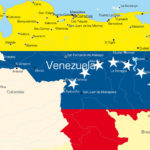
Venezuela is currently in the midst of a horrible hyperinflationary crisis. Years of government mismanagement of the economy have resulted in a situation in which basic necessities and foodstuffs are almost impossible to find. Venezuela’s crisis offers a cautionary tale not just for governments who try to print their way to prosperity, but for everyday citizens who want to protect their assets from devaluation.
The Background in Venezuela
Venezuela was once one of the richest countries in the Western Hemisphere. With its vast oil reserves and other natural resources, Venezuela became the envy of South America. Unfortunately, a series of governments sought to exploit those oil reserves for their own purposes, nationalizing the industry and attempting to use oil revenues to pay for increased social spending.
When oil revenues weren’t sufficient, the government resorted to printing money to pay its bills. This inflation occurred periodically, leading to a series of currency devaluations and eventually the introduction of new paper currencies.
The latest round of inflation has culminated in a hyperinflationary crisis, as the government has printed huge amounts of money, shipping it in by the planeload from foreign printers. The hyperinflation has driven down the value of the bolivar, price controls instituted by the government have driven goods from shelves, and now neither the people nor the government has enough good money to purchase basic staples. Monetary mismanagement has led to a humanitarian crisis.
Paper Assets Are Worthless
Venezuela’s crisis has almost completely destroyed the value of the bolivar, the country’s paper currency. Just like in Weimar Germany’s hyperinflationary crisis, residents are forced to use huge bundles of money just to purchase everyday goods. That’s assuming they can even find those goods, as staples like toilet paper, basic medical supplies, and meat has largely disappeared from the marketplace. Government price controls have forced many goods onto black markets.
The Importance of Gold
The Venezuelan government itself understood the importance of gold, as it repatriated its gold holdings from the New York Fed’s gold vault in 2011 and 2012 and brought them back to Venezuela. While this was touted initially as a move to secure its gold holdings, the government has subsequently sold significant amounts of gold to pay its debts. It may very well find itself with no gold left if it fails to keep its financial house in order.
Contrast that with ordinary Venezuela citizens, who understand the importance of gold. Venezuela has some of the largest estimated gold reserves in the world, with 10,000 tons of gold estimated to be held in its mines. Unfortunately, the Venezuelan government has mismanaged those gold reserves too, and official gold production figures have declined over 90% from their levels a decade ago.
It is estimated that today about 90% of gold production is illegal small-scale mining. Desperate citizens or criminal gangs will mine small amounts of gold wherever they can find it, then try to smuggle gold dust out of the country to sell it for cash or exchange it for food and medicine.
Venezuela’s current situation should be a lesson for Americans first of all about the dangers of government monetary manipulation. When governments have complete control over money, the temptation to print more money to pay their bills can sometimes be too great. When that results in hyperinflation, the result is an economy and country in shambles. The second lesson is that when everything else breaks down, gold steps up to fill the breach. It is the ultimate money and store of value. Don’t wait for things to go to pot before protecting your assets with gold.
The post Venezuela’s Hyperinflation and the Importance of Gold appeared first on Goldco.
No comments:
Post a Comment